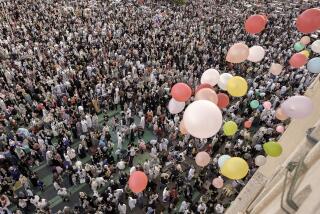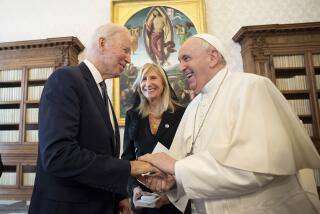Bush Praises Virtues of Islamic Faith
- Share via
WASHINGTON — Faced with a negative perception of the United States in the Islamic world, President Bush visited a mosque Thursday as his administration sought to deepen support for the international campaign against terrorism.
His trip through snowy streets to the Islamic Center of Washington reflected what the White House has presented as a constant theme since the Sept. 11 attacks -- the importance of reaching out to Muslims, made all the more meaningful as the confrontation with Iraq grows more tense.
A poll released Wednesday by the Pew Research Center said that the United States is held in disfavor in the Islamic world and, in particular, that it faces severe opposition within two important Islamic allies, Pakistan and Turkey.
Marking the confluence of Hanukkah, the end of the holy month of Ramadan that is celebrated with the feast of Eid al-Fitr and the arrival of the Christmas season, Bush paid homage to Judaism, Islam and Christianity over a 24-hour period, using each ceremonial stop to promote his anti-terrorism agenda.
And in a meeting with two African leaders, President Daniel Arap Moi of Kenya and Prime Minister Meles Zenawi of Ethiopia, he related the theme to the tinderbox Horn of Africa.
“The war on terror is global in nature,” he said, noting that “if the terrorists could strike in Kenya, they could strike in Ethiopia, they could strike in Europe.”
Although his remarks throughout the day echoed what has become a central focus of his presidency -- the refusal of the United States and its allies to knuckle under to the threat of terrorism -- his efforts Thursday suggested the extent to which he needs to reach out to the Islamic world.
The poll found, for example, that 83% of the Turks surveyed oppose the use of their country’s military bases to strike Iraq. Turkey, sitting on Iraq’s northern border, is expected to have an important role in the event of war, helping the United States engage Iraqi forces on a second front.
In Pakistan, the percentage of those holding a favorable view of the United States slipped from 23% to 10% over barely two years, as the United States has taken on a dramatically increased presence in the region after last year’s terrorist attacks and the subsequent military operation that deposed the Taliban rulers in neighboring Afghanistan.
At a news briefing Thursday, White House Press Secretary Ari Fleischer said Bush has acknowledged that in “some areas in the Muslim world ... the United States has a job to do, and we have to bring people together between the United States and the Muslim world.” But in some other areas, he said, the poll showed favorable impressions of the United States.
Fleischer also pointed out that the United States had won Syria’s assent to U.N. Security Council Resolution 1441, authorizing the dispatch of weapons inspectors to Iraq. But he said he would not predict whether Syria would go beyond that vote, a reference to the question mark hanging over the Arab world’s support for a U.S.-led war with Iraq.
The president visited what he called “this beautiful mosque” at the Islamic Center at midday, taking yet another step in the administration’s campaign to counteract animosity in the Islamic world toward the United States.
Bush also visited the mosque six days after the attacks on New York and the Pentagon in the initial effort to reach out to Muslims when they were the target of attacks and threats across the country.
As night fell, Bush, in a topcoat and tan cowboy hat, threw the switch to light a Christmas tree on the Ellipse, between the White House and the Washington Monument. And on Wednesday evening, on the ground floor of the White House, he stood by as two young girls lighted a menorah on the sixth night of Hanukkah, also known as the Festival of Lights.
The president’s message at the mosque served to reinforce his effort to reach out to Muslims here and abroad, drawing attention to what he presented as the generosity and morality of Islam.
“Millions of our fellow Americans practice the Muslim faith; they lead lives of honesty and justice and compassion,” he said.
“The spirit behind this holiday is a reminder that Islam brings hope and comfort to more than a billion people worldwide. Islam affirms God’s justice and insists on man’s moral responsibility.”
The meeting with the leaders of Kenya and Ethiopia followed a week after the attacks in Mombasa, the Kenyan port where 16 people were killed in a car bombing at a hotel that caters to Israelis and an attempt was made to bring down an Israeli airliner.
The president said Wednesday that the attack was the work of the Al Qaeda terrorist network, but he presented no specific evidence.
With the two leaders joining him in the Cabinet room, Bush said Moi and Meles were “two steadfast allies ... when it comes to winning the first war of the 21st century.”
He said the United States was “pleased with the information-sharing we’re getting from our allies here.”
More to Read
Sign up for Essential California
The most important California stories and recommendations in your inbox every morning.
You may occasionally receive promotional content from the Los Angeles Times.










